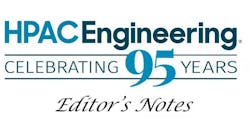Variable-Refrigerant-Flow Technology Helps College Achieve LEED Silver Certification
Built in 1885, Archdale Hall is the oldest building on the campus of the third-oldest coeducational college in the United States, Guilford College in Greensboro, N.C. For 80 years, it served as a men’s dormitory before being converted to faculty offices. Last renovated during the 1950s, it inspired frequent complaints about cooling and heating discomfort, noise, and indoor-air quality (IAQ) and was highly energy-inefficient. The college’s associate vice president of operations and facilities, Jon Varnell, was looking for sustainable, eco-friendly solutions and aiming to have the building achieve Leadership in Energy and Environmental Design (LEED) certification.
After touring the building, a trusted partner in the HVAC business introduced Varnell to multisplit variable-refrigerant-flow (VRF) technology with zoned inverter-driven heat-pump and heat-recovery systems. To solve the building’s problems, Varnell chose a VRF zoning system manufactured by Mitsubishi Electric Cooling and Heating Solutions. The system’s inverter technology maximizes individual comfort in separate zones, improves IAQ, and often cuts energy costs in half.
For help implementing the VRF zoning technology, Varnell turned to Spectrum Design PC of Roanoke, Va., a firm known for environmentally friendly designs for education facilities.
“Although new to Mitsubishi Electric technology, we soon learned that it was a great concept for Archdale Hall, an excellent choice for renovating old buildings, and a good fit for achieving LEED certification,” Mark Garland, Spectrum Design green-building coordinator, said. “The Mitsubishi Electric installation contributed to seven of the 39 points on the LEED-NC (LEED for New Construction & Major Renovations) Version 2.2 registered-project checklist.”
Tom Foster, PE, CBCP, LEED AP, founder of Commissioning WorCx of Jamestown, N.C., commissioned Archdale Hall’s energy systems.
“This was my first experience with commissioning a VRF system,” Foster said. “I am very impressed with the performance of Mitsubishi Electric’s VRF zoning technology. The R2-Series system specified has solved every complaint from the faculty occupants of Archdale Hall. I also know that the Mitsubishi Electric system installation and equipment costs saved Guilford College a large six-figure price tag from a water-source-heat-pump system (with 12 wells) originally specified.”
Varnell said VRF zoning systems are a great solution for the many challenges presented by a building as old as Archdale Hall.
“The system is a complement to the artful renovation of the building’s interior,” Varnell said. “Mitsubishi Electric’s floor-standing exposed indoor units are ideal for offices with no ceiling space for ducting. They have a highly efficient air-conditioning performance and low operating sound, which have made the faculty who occupy the offices very happy.
“Because of the satisfaction of the Archdale Hall installation,” Varnell continued, “the Guilford Board of Advisors has made a new directive that all future campus renovations must strive to achieve LEED certification.”
ENERGY SAVINGS
According to a 2011 report prepared by the Guilford College Energy Team, since the installation of the Mitsubishi VRF technology in Archdale Hall in September 2008, Guilford College has seen a 50-percent reduction in energy costs—from $2.40 per square foot in fiscal year 2006 to $1.20 per square foot in fiscal year 2010—and a 61-percent reduction in energy use. Furthermore, the college has reduced maintenance costs by eliminating the need for campus steam to serve as the building’s heating element. Now, the building relies solely on electricity for cooling and heating. The VRF system has allowed for a more comfortable and sustainable environment for occupants, with energy costs 28-percent less than those of buildings with similar usage patterns and square footage.
For Design Solutions author guidelines, call Scott Arnold, executive editor, at 216-931-9980, or write to him at [email protected].









